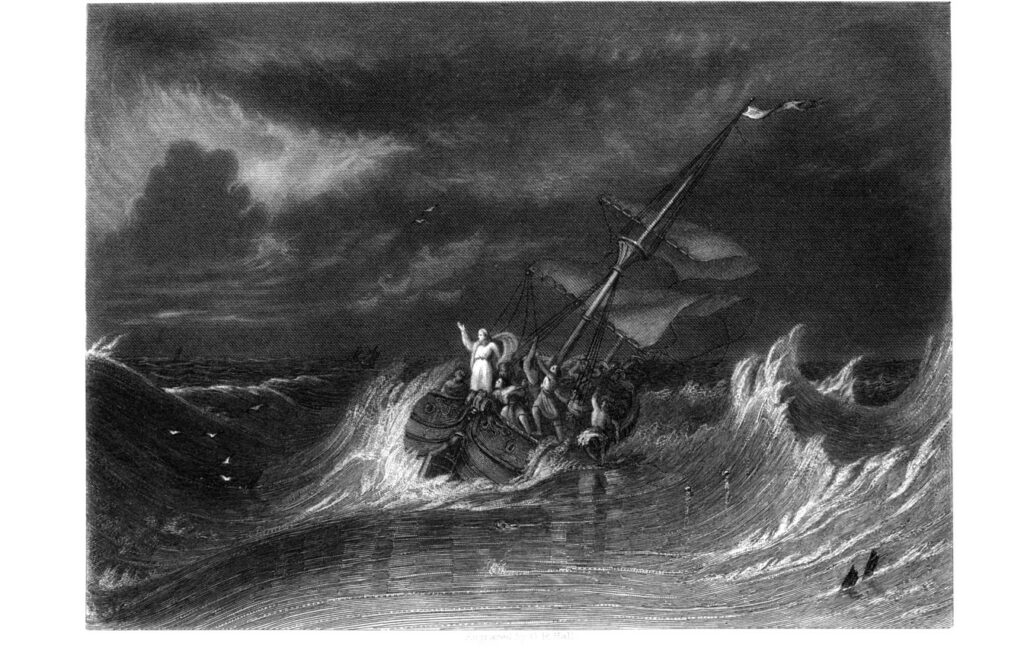When things seem to be coming at you faster than you can react, it’s easy to let anxiety take control of your vessel. When you aren’t sure where you’re going, how you’re going to get there, or what’s coming next, it’s important to find a way to recalibrate.
We know that God is ultimately in control of our lives, but we all face seasons in which it’s hard to remember that. If you need to recalibrate, keep reading.
If you’ve ever used a GPS system to help you get from where you’re at to where you’re going on a trip, you may have run into a moment where the system tells you that it is recalibrating or recalculating.
This usually happens when you’re on a road that the GPS doesn’t recognize, or you’ve taken a wrong turn somewhere. When you’re depending on a GPS to help you get where you’re trying to go and the system tells you that it doesn’t know where you are, it’s normal for fear and anxiety to take over.
In our emotional, mental, and spiritual lives, we often face the same concept, but it comes in an inversed order. It’s easy to become so consumed by fear and anxiety that we lose sight of our direction. While being on the wrong road in the natural sense can induce anxiety, when we’re talking about the direction of our lives, our anxiety can often put us on the wrong road.
Perhaps you’re facing a season of immense anxiety. If that’s the case, today is the day for a recalibration. The things going on around you don’t have to seize control of your life. However, it’s easy to let them.
If you need a recalibration, today is the day.

Paul’s Storm
Acts 27
Near the end of the Book of Acts, we find Paul once again imprisoned and heading for another trial. Peter, the man who authored the Book of Acts was with him, and the story that we’re about to dive into is told from Peter’s point of view.
These believers in Christ faced one of the most anxiety-inducing storms that they had ever seen and were then faced with other seemingly impossible situations. It was crucial for them to recalibrate in the face of their adversity.
Acts 27:13-15 (TPT)
When a gentle south breeze began to blow, they assumed they could make it, so they pulled up anchor and sailed close to Crete. But it wasn’t long before the weather abruptly worsened and a storm of hurricane force called the Nor’easter tore across the island and blew us out to sea.
The sailors weren’t able to turn the ship into the wind, so they gave up and let it be driven by the gale winds.
The men who were well-versed in sailing gave up in the face of this storm. They had seen storms before, but there was something different about this one. This wasn’t a thunderstorm, this was a hurricane. This wasn’t some wind and a couple high waves. This was the kind of storm that broke ships and left people dead in the water, literally and figuratively.
Our seasons of anxiety can have the same impact as the storm had on these sailors. It’s easy to become so consumed by the things going on around us that we’re tempted to give up and let the storm take control. Your circumstances and anxiety don’t have control of your vessel!
Acts 27:18-20 (TPT)
The next day, because of being battered severely by the storm, the sailors jettisoned the cargo, and by the third day they even threw the ship’s tackle and rigging overboard. After many days of seeing neither the sun nor the stars, and with the violent storm continuing to rage against us, all hope of ever getting through it alive was abandoned.
There is a lot to unpack in these three verses. First of all, the sailors did everything within their power to fix the situation. They had given up on steering the ship, so their only course of action was to throw off all the cargo. We know that their efforts were futile, but in the moment, they truly believed they were doing what was best.
Don’t we do the same thing?
When we’re overwhelmed by our circumstances, we try to take matters into our own hands, lighten our own load, and set ourselves up for success. Our efforts are every bit as futile as the efforts of these sailors.
Secondly, take note of the fact that they didn’t see the sun or starts for “many days.” In New Testament times, sailors relied on the sun and the stars for navigational purposes. When they couldn’t see the sun or the stars, it didn’t just mean that the storm was bad. It meant that they had no sense of direction. Now they were overwhelmed, lost, and running out of hope.
Finally, speaking of hope, it was gone. There was no hope. Remember, these Romans sailors who didn’t have a relationship with Christ weren’t writing these words. Instead, Peter penned the phrase, “all hope of ever getting through it alive was abandoned.”
Peter had seen Christ work miracles, but he had no hope of getting through this storm alive. We’re not sure about Paul’s mental state at the time, but Peter did use the term “we,” which seems to indicate that no one in his travel party had any hope of getting out alive.
Sometimes, you become so disoriented by the things going on around you, you lose hope. In those moments, a recalibration is necessary.

Acts 27:21-25 (TPT)
After being without food for a long time, Paul stepped before them all and said, “Men, you should have obeyed me and avoided all of this pain and suffering by not leaving Crete. Now listen to me. Don’t be depressed, for no one will perish-only the ship will be lost.
For God’s angel has visited me last night, the angel of my God, the God I passionately serve. He came and stood in front of me and said, ‘Don’t be afraid, Paul. You are destined to stand trial before Caesar. And because God’s favor on you, he has given you the lives of everyone who is sailing with you.’
So men, keep up your courage! I know that God will protect you, just as he told me he would.
This passage teaches us that Peter wasn’t the only one who was afraid. Why did God say, “Don’t be afraid, Paul”? It was because Paul was afraid! However, Paul sought an opportunity to recalibrate, and God gave him what he needed.
Paul fasted for a long time. We don’t know if it was by choice or because there was no food on the ship once the cargo had been offloaded, but Paul had gone without food “for a long time.”
However, that time of prayer and fasting allowed Paul to receive a revelation from God. The angel of the Lord came to Paul with a message from God. Not only was Paul going to survive the storm, no one on the boat was going to die. Why?
Because Paul had been told years before that he had to stand before Caesar. In Acts 23:11, God told Paul that he would go to Rome to stand trial. Since Paul hadn’t made it there yet, Paul’s story couldn’t end in the storm.
Paul’s process of recalibrating in the face of anxiety provides a great example for us. He started by going into the inner part of the ship away from the storm and focusing on God. Sometimes you need to do the same thing.
When we shift our focus from the storm to the Savior, we can truly allow His presence to recalibrate us. Finally, allow God to remind you of the promises that He has given you. If you haven’t seen those promises fulfilled, your story isn’t over.
A Closing Prayer:
Heavenly Father, you know that I feel like my anxiety is driving my ship. Help me to realize that You are in control. Remind me of the promises that You have given me. In Christ’s name, Amen.


